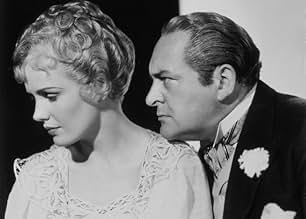Adicionar um enredo no seu idiomaAn ambitious lumberjack abandons his saloon girl lover so that he can marry into wealth, but years later becomes infatuated with the woman's daughter.An ambitious lumberjack abandons his saloon girl lover so that he can marry into wealth, but years later becomes infatuated with the woman's daughter.An ambitious lumberjack abandons his saloon girl lover so that he can marry into wealth, but years later becomes infatuated with the woman's daughter.
- Direção
- Roteiristas
- Artistas
- Ganhou 1 Oscar
- 4 vitórias e 1 indicação no total
- Tony Schwerke
- (as Frank Shields)
- Restaurant Patron
- (não creditado)
- Diner
- (não creditado)
- Man
- (não creditado)
- Gunnar Gallagher
- (não creditado)
- Dining Car Patron
- (não creditado)
- Lumberjack
- (não creditado)
- Thomas Gubbins
- (não creditado)
- Direção
- Roteiristas
- Elenco e equipe completos
- Produção, bilheteria e muito mais no IMDbPro
Avaliações em destaque
According to film historian David Thomson, Farmer's performance was affected by Hawks' replacement by Wyler as director. Apparently, she and Hawks were more than sympatico off the set. So, Thomson's account goes, Hawks brought on writer Furthman to slant the film towards his beauteous blonde, thus causing novelist Ferber to complain to head honcho Goldwyn, resulting in Hawks' departure and a feud between Farmer and Wyler. I mention these behind-the-scenes shenanigans to maybe account for some of the plot's half-digested elements and Farmer's noticeable downturn.
Nonetheless, it's still a compelling movie, thanks mainly to Arnold's dominating presence that holds the various threads together. I also like the logging footage, which lends a dramatically realistic air to Glasgow's empire. Then there's Lotta's haunting rendition of "Aura Lee", which evidently Farmer herself crooned. However, I'm still trying to figure out the title that appears to have little resemblance to the storyline. But however you cut that or the purported intrigues, it's still a dynamic movie.
Story has the ruthless Arnold working his way up in the Wisconsin lumber business, grabbing at everything in sight, including saloon gal Farmer. He seems to care about nothing but getting ahead. When he gets the chance to marry the boss' daughter (Mary Nash), he dumps Farmer and moves on.
Twenty year later, he has it all plus two children: Joel McCrea and Andrea Leeds. By chance he runs into old pal (Walter Brennan in his first Oscar win) who married Farmer. She's dead but her daughter (Farmer again) lives with him along with a niece (Mady Christians). The daughter is a dead ringer for the mother, and Arnold decides to move in on her (in a last gasp at youth).
But when the daughter meets McCrea, it's all over for Arnold. The father and son have a confrontation and the old man sees the light.
This film offers some of the best acting of any 30s film. Edward Arnold is superb, and his final scene is just plain chilling. Farmer is glorious in her dual role, her best chance at film stardom (that never happened). Also solid are McCrea, Brennan, Leeds, and Nash. Supporting cast offers Cecil Cunningham as the wise-cracking and wise secretary.
The film may set a Hollywood record in listing THREE directors. Both Howard Hawks and William Wyler are listed as co-directors while Richard Rosson is credited with the timber scenes (which are great).
Worth a look for Frances Farmer and Edward Arnold!
Você sabia?
- CuriosidadesHoward Hawks's take on his being "fired" is that he wasn't. Rather, he quit, after refusing to agree with Samuel Goldwyn, who wanted the narrative to stay closer to that of the book. Goldwyn had been ill and absent for the 42 days of shooting that Hawks directed and was unaware of Hawks' rewrites. Hawks left the production with only 14 days left to go.
- Erros de gravaçãoDuring the early montage showing the lumber process, fluorescent lights are seen on the ceiling of a workshop. While they had just become commercially available when the film was made, this scene takes place in 1884, decades before their refinement.
- Citações
Swan Bostrom: You.. you love him Lotta...
Lotta Morgan: What do you think?
Swan Bostrom: I think... I think... I think I have another drink.
Lotta Morgan: Hey you better leave some of that for Barney.
Swan Bostrom: I ain't have to. He ain't comin' back.
Lotta Morgan: What did you say?
Swan Bostrom: That's what I tried so hard to tell you and it yust slip out...
- ConexõesEdited into Sunset in Wyoming (1941)
- Trilhas sonorasAura Lea
(1861) (uncredited)
Music by George R. Poulton
Lyrics by W.W. Fosdick
In the score often as Lotta's theme
Performed by Frances Farmer and an unidentified quartet in LeMaire's bar
Reprised later by her, Edward Arnold and Walter Brennan
Principais escolhas
- How long is Come and Get It?Fornecido pela Alexa
Detalhes
- Tempo de duração1 hora 39 minutos
- Cor
- Proporção
- 1.37 : 1






































